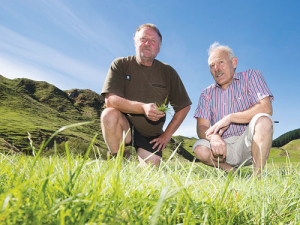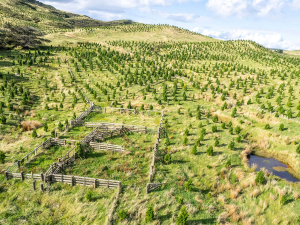Omapere Taraire E & Rangihamama X3A Ahu Whenua Trust
The farm run by the trust is located 2km northwest of Kaikohe, and is regarded by its shareholders as a taonga tukuiho, gifted to them over time by their ancestors.
Until the 1950s the Omapere land was in separate titles occupied by individual/whānau owners who grew food and ran small dairy units.
The individual lots became uneconomic and some became neglected and were amalgamated into the present trust; big improvements were made to the farm.
Of the trust’s 1997ha, 1253ha (902ha eff) raises sheep and beef. In the past the farm combined sheep and beef, but it has moved away from sheep to beef for the better returns from bull beef and because of poor returns for wool and meat.
The farm is mainly undulating with some flats, making it ideal as a finishing farm. The bulls are bought in as rising one-year-olds and then sold as two-year-olds. The stock are fed grass only.
A manager and three staff run the farm, reporting to a committee -- a consultant, a shareholder and a trustee, chosen for farm knowledge.
The farm has the only Māori-owned lake in Aotearoa – Lake Omapere, considered sacred and a taonga (treasure) in its own right.
RA & JG King Partnership, Puketawa Station
Puketawa Station is a sheep and beef breeding unit located at Tiraumea, about 45 minutes east of Pahiatua in northern Wairarapa.
The property of 1108ha (900ha eff) is mainly medium-steep hill country with some rolling contours.
Breeding stock number 3177 Romney breeding ewes, 850 ewe replacements and 148 stud ewes. The cattle are 144 mixed, mainly Hereford cows and replacements.
The farm was bought by Ronald and Justine King in 2013. It was in a “tired” condition and they have worked hard to improve pastures and infrastructure.
The Kings’ journey to buying Puketawa is remarkable. Ronald originally owned a 112ha sheep and beef farm near Whangamomona, Taranaki. In 2001 he and his three siblings and their partners, all accomplished shearers, pooled their resources and bought Mangaroa Station, Ruakituri Valley, northern Hawke’s Bay.
The whānau bought Mangaroa to work collectively and build their assets, so as to eventually all buy their own large scale farms. Later, the whānau also bought Ruakaka Station in nearby Tiniroto Valley, which they also worked hard to improve and develop.
The hard work and paid off: all the siblings now own farms, providing role models of cooperation and determination.
Ronald’s sister Nukuhia Hadfield and her husband Bart won the Ahuwhenua Trophy for the top Māori sheep and beef farm -- Mangaroa Station, 2015.
Pukepoto Farm Trust
This small farm trust, with just over a 1000 owners, is located near the tiny settlement of Ongarue, 20 minutes north of Taumarunui, King Country.
Pukepoto (little hill) is a misnomer because the farm is typical hill country with high, steep hills and gullies that feed into the Ongarue and Ohura rivers and ultimately the Whanganui River.
The property of 1400ha has just over 1000ha are farmed. About 100ha is covenanted under the Ngā Whenua Rāhui scheme. There is 62ha in plantation pine and the unfarmed remainder is scrub, much of it being retired to prevent erosion. The trust has worked with Horizons Regional Council in doing this.
The property now winters 6000 Romney ewes and 300 mainly Angus cattle.
Established by the Māori Land Court in 1978, the original trust was known as Pukepoto Forest and Farm Trust. In 1994, through an order of the Māori Land Court, it was renamed to Pukepoto Farm Trust.
Over recent years Pukepoto’s trustees have worked on lifting the performance of the overall business.
All welcome
Field days will be held at the farms of all the finalists.
Everyone is welcome at this wonderful opportunity to see first hand the achievements of these Maori farmers, and perhaps to pick up a good idea or two.
The timetable for the field days is:
Thursday April 20 – Omapere Rangihamama Trust (Kaikohe, Far North)
Thursday April 27 – RA & JG King Partnership, Puketawa Station (Eketahuna, Northern Wairarapa)
Thursday May 4 – Pukepoto Farm Trust (Ongarue, near Taumarunui).

















